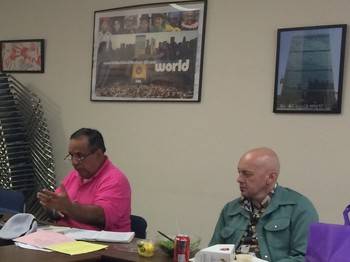 Germán Zárate of the Diaconia of the Presbyterian Church of Colombia is visiting this week to discuss the church in Colombia, social justice and his work with the Colombia Accompaniment Program, a collaborative partnership among the Presbyterian Peace Fellowship, Presbyterian Church (U.S.A.) World Mission, and the Presbyterian Church of Colombia or Iglesia Presbiteriana de Colombia (IPC). Colombia has a violent history, with communities finding themselves displaced as a result of the Free Trade Agreement, and caught between drug trafficking guerrilla groups and corruption in the government. His talk highlighted the need to reeducate the people – the grassroots – to hold the government responsible and to not accept political corruption as a normal occurrence. The Church’s presence tries to encourage citizens to have hope and strives to act as a servant to civil society.
Germán Zárate of the Diaconia of the Presbyterian Church of Colombia is visiting this week to discuss the church in Colombia, social justice and his work with the Colombia Accompaniment Program, a collaborative partnership among the Presbyterian Peace Fellowship, Presbyterian Church (U.S.A.) World Mission, and the Presbyterian Church of Colombia or Iglesia Presbiteriana de Colombia (IPC). Colombia has a violent history, with communities finding themselves displaced as a result of the Free Trade Agreement, and caught between drug trafficking guerrilla groups and corruption in the government. His talk highlighted the need to reeducate the people – the grassroots – to hold the government responsible and to not accept political corruption as a normal occurrence. The Church’s presence tries to encourage citizens to have hope and strives to act as a servant to civil society.
In addition, Germán mentioned all the knowledge that one can glean from those living and thriving despite all the odds stacked against them. This ability to exist, to make a life for oneself and one’s family despite displacement, poverty or social unrest, is truly remarkable and one that deserves attention. He emphasized love as a tool for transformation. “Love your neighbor,” he said, “ reminds me that my neighbor is like me.” Indeed, the only way to make social change is to be one with the people, to sacrifice and love and to walk alongside them.
The Presbyterian Church in Colombia is small yet mighty, with the mission of protecting life, working for reconciliation, and practicing an active form of faith.The church started the Accompaniment program in 2005 as a nonviolent response to threats made against peacemakers trying to fight the systemic causes that were (and still are) displacing communities.
Accompaniers come from Presbyterian and other churches in in the United States as volunteers to simply be with the people, learn their stories, and “walk with them” in times of hardship. It’s a nonviolent way to bring protection through the simple act of being an American body who, in his or her presence, draws attention to any wrongdoing or injustice in that village. Many of the displaced communities are truly traumatized by the violence they have experienced their whole lives, so having an outside ear to listen to their stories is a therapeutic experience for these people.
We are thankful to have Germán here with us this week; we have learned so much from his stories, experiences, and humor!